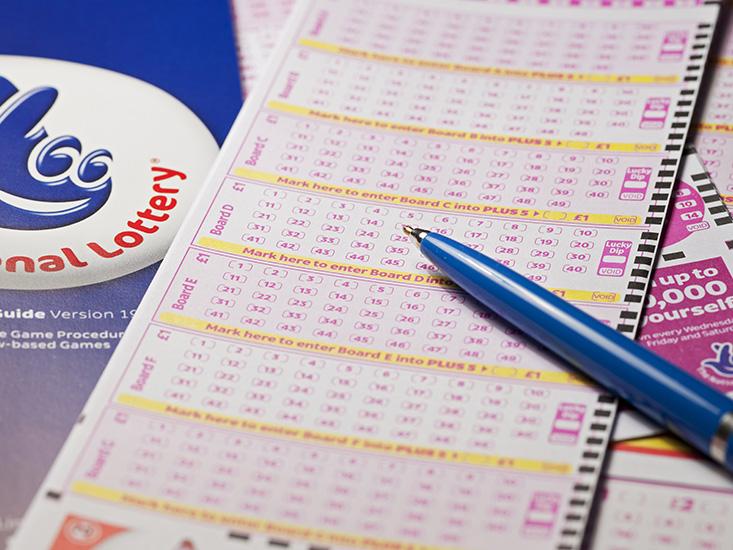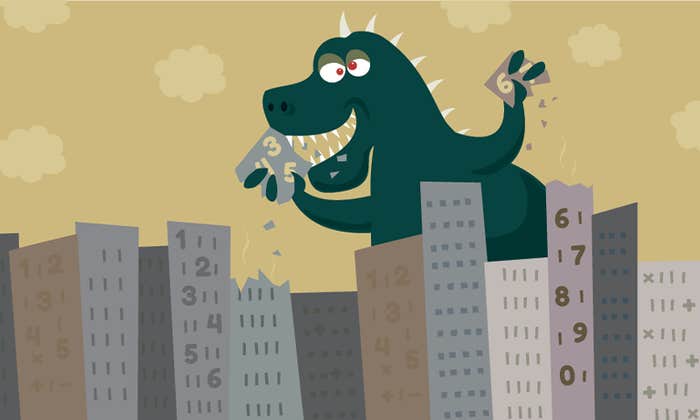Would you say you are a lucky person? Have unexpected things turned up which made your life better? I don’t mean something as extreme as a major lottery win, but perhaps getting a job because a stronger candidate dropped out with the flu, or catching the train despite being late because it was delayed?
Or would you say you are unlucky? You missed the key job interview because you caught the flu, or missed that train because it was cancelled?
Or perhaps you don’t believe in luck, thinking that people make their own good—or bad—fortune, and that success in life is down to hard work and persistence. Of course, even if you believe that, it can’t be a complete explanation—no matter how hard you worked, you could not make that cancelled train appear. There are always things beyond your control.

Luck is obviously closely related to the concept of chance, but it’s not quite the same. Chance describes an aspect of the physical universe: It’s what happens out there. The coin coming up heads rather than tails, the die falling to show a six, and even a particular one of the 45,057,474 possible tickets in the United Kingdom National Lottery being drawn. In contrast, luck attaches a value to the outcome of chance. Luck is chance viewed through the spectacles of good or bad fortune. It’s really good news, at least for you, if you win the lottery, and it’s really bad news if you’re one of the passengers on the plane when it crashes.
Chance, then, is the objective reality of random outcomes in the real world, while luck is a consequence of the subjective value you place on those random outcomes. Luck, we might say, is chance with a human face. Understanding this gives us a clearer view of reality, and a clearer view of reality means we can choose better courses of action.
Good luck is something to be desired—having good luck means that the chance events you experienced had positive outcomes. And bad luck is something you hope you don’t get. Which naturally leads to the question: Is there anything we can do to make ourselves luckier?
We could try to do this by changing what we regard as a good outcome, but that seems unreasonable. Slipping on ice and breaking your leg seems unlucky however you look at it, whereas it’s hard to see winning the lottery as unlucky. So perhaps instead we should look for ways to alter the chance, the probability, that different outcomes will occur.
And the world is full of beliefs that we can change our chances, and hence our luck.
Superstitions are examples: baseball pitcher Turk Wendell drawing three crosses in the dirt before pitching; Manchester United soccer player Phil Jones putting his left sock on first when the team played at home, but his right sock on first when the team played away; you taking your favorite pen into the examination room. Unfortunately, there’s precious little evidence that any such things increase the chance of a favorable outcome.
By increasing the chance of a favorable outcome, you can make your own luck.
On the other hand, there’s an old saying, attributed in various forms to Thomas Jefferson, Stephen Leacock, Sam Goldwyn, and others: “The harder I work, the luckier I get.” It’s certainly true that if you train hard you are more likely to win a sporting event, but it clearly does not explain everything. Your hard work does not reduce the chance of being kept awake by noisy neighbors the night before, or slipping on a wet patch as you run during the race. And people seem to win lotteries regardless of how dissolute a life they lead.
Louis Pasteur said something similar: “Chance favors the prepared mind”—making sure you are able to recognize and grasp opportunities when they arise.
One kind of preparation is to take advantage of what’s called the law of truly large numbers.1 This is not the same as the statistician’s law of large numbers, which describes how averages get closer and closer to a fixed value the more numbers you put into the average. It’s something quite different.
Let’s begin with the truism that, while you have a tiny chance of winning the lottery if you buy a ticket, you can guarantee that you won’t win if you don’t buy one. So that’s quite a big difference between two chances, from nothing to something, even if that something is still very small. But we can then take this idea further. Obviously, the more (differently numbered) tickets you buy, the greater your chance of winning. Buy 1,000 tickets instead of just one, and your chance of winning is 1,000 times greater. Buy 1 million—a truly large number—and your chance is even greater. I should comment parenthetically that I am not encouraging you to buy lottery tickets. With the U.K. National Lottery a single ticket has a 1 in 45 million chance of winning the jackpot. If you buy 1,000 tickets you still have only a 1 in 45,000 chance of winning. That’s less likely than getting 15 heads in a row tossing a fair coin. Is that something you’d want to bet on?
Still, this example shows that if we increase the number of opportunities for a very improbable event to occur (drawing the winning ticket), we can increase dramatically the chance that it will happen. Put another way, if we give ourselves lots of chances for something good to happen, we can increase our chance of succeeding. This is beginning to look very much as if we can improve our luck.
Actually, we can take this further. If you had a spare £90 million lying around (that’s £45 million times two; times two because each ticket costs £2), you could buy all possible combinations of six numbers between 1 and 59 (each ticket in the U.K. National Lottery consists of six numbers chosen from 1 to 59), and so guarantee holding the jackpot winning ticket. This is going beyond the law of truly large numbers and entering the realm of the law of inevitability. This simply says that one of the set of all possible outcomes must happen: It’s inevitable that one of them will occur because, by definition, there isn’t anything else.
Returning to the law of truly large numbers, it obviously does not apply solely to winning the lottery, and in fact the numbers need not always be truly large.
Di Coke lives in Brighton in the U.K., and has won over £300,000 worth of prizes from competitions. These have included overseas holidays, a trip to the Brazilian Grand Prix, a trip to New Zealand, a car, five iPods, two computers, a ticket to the British Academy of Film and Television Arts awards, and money. Overall, she averages wins equivalent to more than £15,000 per year.
What a lucky woman, you might think. But the fact is Di doesn’t rely on blind chance; she uses the law of truly large numbers to increase her chance of getting lucky. She does this by entering over 400 competitions per week. She might have a small chance of winning any one of them, but with so many competitions over the course of a year the chance that she won’t win any is vanishingly small. She can pretty well guarantee some wins. She’s making her own luck.
And have you ever read enviously of an entrepreneur who has just sold his start-up for millions of dollars? If so, ask yourself, was that their first attempt? Did they in fact keep going, through failure after failure, until they happened to hit the jackpot?
Whether you see it as lucky or unlucky, the chance event is the same.
And what about job applications? Appointment to a position always involves an element of chance. Who else has applied? What exactly was the appointments panel looking for? Will all the members of the panel see eye to eye? You may be unlucky not to get a particular job, but keep applying and you increase your chance of winning some job.
The key to all this is to give chance the opportunity to produce an outcome in your favor: to give yourself a chance of getting lucky. If you don’t apply for the job because you believe you will be unlucky, then you are certain not to get it. By increasing the chance of a favorable outcome, you can make your own luck.
But when Pasteur commented on a prepared mind, he didn’t just mean keep trying until you succeeded. He also meant something deeper: that he was ready to see an opportunity when it arose, and to see the links and relationships that others wouldn’t notice. This notion also applies in job applications as much as in science. Prepare for that application by carefully studying what they are after and you are more likely to be lucky.
At a higher level, people who regard themselves as lucky will tend to be more outgoing. And there’s certainly a causal relationship here, although it works in both directions. An outgoing and positive person will be more open to new ideas, new people, and new experiences, and so give themselves more opportunities for positive things to happen. They are more likely to get lucky. But then, positive experiences—learning that good things happen—are likely to make someone more prepared to risk new things. Leading to a self-reinforcing cycle.

We’ve already seen that luck is different from chance: It’s chance viewed through the mind’s eye. This is illustrated very clearly by people’s attitudes to accidents. For example, people often describe as good luck events that an objective observer might describe as horribly bad luck. Someone involved in a traffic accident in which their car rolled over three times and was a write-off, but from which they emerged unscathed, might well remark on how lucky they were. Others might think they were very unlucky to have been involved in the accident in the first place. If a rock falls off a cliff face just as you are walking beneath, and narrowly misses you, you might well say how lucky you were that it missed, instead of saying how unlucky you were to be there at the time it fell. But whether you see it as lucky or unlucky, the chance event is the same.
The fact that luck is a human construct is forcefully brought home when we experience a sequence of chance events, one after the other. For example, an accumulator bet involves betting on just such a sequence of events, winning only if all of the events in the sequence happen.
In August 2015, a Manchester United fan from Lichfield in the U.K. placed a 30p bet on a sequence of outcomes of 15 soccer games, leading to winnings of half a million pounds. But although this outcome has almost the same chance as getting the first 14 soccer matches right and the last one wrong, we would have described him as extremely unlucky had he lost that last bet. And in 2008, when Yorkshireman Fred Craggs placed a 50p stake on an eight horse accumulator, and watched all of his horses romp home, giving him a cool £1 million winnings, we would have described him as unlucky had he got all but the last one right.
It doesn’t always go as planned. Indeed, it rarely does so. Joe McGuire placed an accumulator bet on a sequence of six horse races, watching his £10 million jackpot get closer and closer as the first five winners came in according to his predictions, only to lose it all when Escape to Glory and Justonefortheroad, the two horses he had bet on in the final race, came in second and sixth. And guess what? One report described him as “Britain’s unluckiest punter.”
Wherever we are in life, we can look back and identify a chain of events that led us there.
Suppose we are pretty good at picking winners in horse races, and can pick the winner of any race with a probability of ½. That means that we can expect to get about half right. Now suppose we bet on a five step accumulator. Then the chance of getting the first right is ½, the chance of getting both of the first two right is ½x½ = 1/4, the chance of getting the first three all right is ½x½x½ = 1/8, and so on up to a chance of getting all five right of 1/32.
This idea has been used in unethical stock price movement predictions. We begin by claiming to be able to predict stock movements; in particular, we will aim to predict whether the market will move up or down next week. We identify 1,024 people, and to 512 of them we send an email saying the price will move up next week, and to the other 512 we send an email saying it will move down. We will be right for one of these two groups, and we discard the other. Next week, for 256 of the 512 we got right, we send an email saying the price will move up and to the other 256 an email saying it will move down. Again we must get it right for one of these two groups. And we go on in this way, always dropping the group we sent the wrong prediction to, and turning our attention to the other. After 10 weeks like this we have one person left, who has seen us make 10 successive correct predictions about the stock market movements—and does not know about the other 1,023 people. To this person we then send an email saying something like “you can see that our algorithm works. If you want our prediction for next week, it will cost you $10,000.”
This scam has made use of the law of inevitability: There are only 1,024 possibly up/down patterns in 10 steps, so one of them must come up. And it has also made use of another law, the law of selection, which says you can make probabilities as large as you want if you choose after the event. In this case, step by step, you appear to have chosen the single pattern of 10 correct predictions—and you can always do this.

A less extreme version of this arises accidentally in the legitimate investment advisor space. Imagine a large population of such advisors, and suppose, for the sake of argument, that none of them are any good—that their predictions are no better than chance. And let’s follow their fortunes over 10 weeks of up and down market movements as before. Now, at each week, some of them (about half) will get it right, purely by chance—we might say they are lucky that week. Of course, the chance that any particular one of them will get their predictions right for all 10 weeks is just 1/1024, since there are 1,024 patterns. But if there are enough of these people then we would expect some of them to get all 10 right, just by accident. Or by chance, since they don’t have any skill. But those lucky ones, the ones who got many predictions right by chance simply because it was likely that some would, are the ones who see investors flocking to them. Only to be disappointed as they move into the future and the predictions turn out to be no better than chance, with about half right and half wrong.
Di Coke, the multiple competition winner, also uses a variant of the law of selection, though in a less extreme way. Perhaps counter-intuitively, she recommends focusing on competitions that take time and effort. Her argument is that fewer people will enter these competitions, so her chance of winning is greater. This clearly makes sense. At an extreme, if only one person gives the right answer, then that person would win. For this same reason, she recommends against entering competitions that involve random draws (like the lottery). Such competitions are easy to enter, so you get huge numbers of people entering, and if there is to be only one winner—for that exotic holiday say—then you are proportionately much less likely to be that person.
Wherever we are in life, we can look back and identify a chain of events that led to us being there. If I hadn’t been raised in that village at that time, I wouldn’t have met the teacher who introduced me to playing that musical instrument, so I’d never have played in that band, and I wouldn’t have met the woman who had a shared interest in antiques and introduced me to the dealer who offered me the job. “How incredibly lucky,” we might think, “that just those things happened which resulted in me being where I am now.”
But that’s misleading. Wherever we’ve got to now must have been preceded by some sequence of chance events that had to play out as they did to lead to us being where we are now. So we can always find such a chain.
The bottom line is that stuff happens. Chance, the essential unpredictability of the natural world just rolls on, flipping things this way and that way at random. But we look at the outcomes, we relate them to our lives, and we interpret them differently. We say, “Wasn’t I lucky?” or “Wasn’t I unlucky?” as the case may be. Luck is our attempt to find meaning in a meaningless universe.
David J. Hand is Emeritus Professor of Mathematics at Imperial College, London, where he was previously a professor of statistics. He studied mathematics at Oxford, and statistics at Southampton University in the U.K. He has published 29 books and over 300 scientific papers.


























